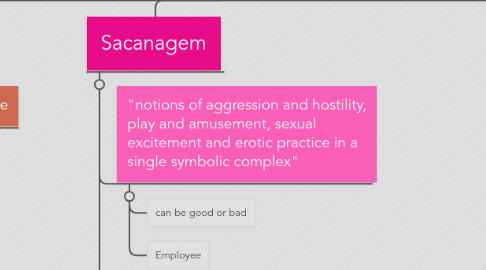
1. Machismo
1.1. sexual joking and teasing
1.1.1. how men and women participate
1.1.2. common
1.1.2.1. practices by young and old alike
1.1.3. how they reveal the local sexual culture
1.1.4. Valdirene
1.1.4.1. Gloria's mother
1.1.4.2. prudish
1.1.4.3. devout member of the Assembly of God Church
1.1.4.4. dream
1.1.4.4.1. erect penis of her dead husbands
1.1.4.4.2. Gloria would use the story to entertain her children, friends and neighbors
1.2. film 'O Amor Natural'
1.2.1. elements of Rio's diverse population
1.2.2. special attitude Brazilians have toward their own bodies
1.2.2.1. eroticism in general
1.2.2.2. devoted to their own normative heterosexuality
1.2.2.3. gendered double standards on fidelity
1.2.3. explicitly erotic poetry
1.3. working class Cariocas
1.3.1. unhealthy for men to go too long without sex
1.3.1.1. provoke insanity
1.3.1.2. boys are encouraged and expected to become active seducers
1.3.1.2.1. Gloria sends her son Lucas to visit a prostitute
1.3.1.2.2. impossible to grow up in Felicidade Eterna and have no sexual knowledge
2. sexual permissiveness
2.1. foreigners seduced by sexual culture
2.1.1. Author fell into the culture
2.2. public flirtation
2.2.1. not objectification of women's bodies
2.2.1.1. appreciated as pleasurable
2.2.1.2. being publicly recognized as sexual is important for them
2.2.1.2.1. being ignored is considered a true punishment
2.3. homosexuality in Brazil
2.3.1. upper-class model
2.3.1.1. "important"
2.3.1.1.1. Western Europe and North America
2.3.2. lower-class model
2.3.2.1. 'bichas' - meaning worm or "faggot"
2.3.2.2. compromised by their social and sexual role
2.4. Feminism in Brazil
2.4.1. perceived as "sex-negative"
2.4.1.1. North American feminism is considered radical
2.4.1.1.1. avoid at all costs
2.4.2. legalized abortion
2.5. "to eat"
2.5.1. sexually derogative term
2.5.2. to consume a person sexually
2.5.3. females are to be consumed
2.5.4. gendered power relations
2.5.5. turned upside down by humor
3. Sacanagem
3.1. "notions of aggression and hostility, play and amusement, sexual excitement and erotic practice in a single symbolic complex"
3.1.1. can be good or bad
3.1.2. Employee
3.2. transgression
3.2.1. women cast the role of sexual boundaries
3.2.1.1. men, ideally, are expected to transgress
3.3. Mauro
3.3.1. Gloria's boyfriend after Zezinho
3.3.2. Soneca and Gloria stay the night at is house
3.3.2.1. exus statues
3.3.2.1.1. Soneca feared deeply
3.4. Foucault's genealogy of ethics
3.4.1. centered on the desire and comportment of elite male citizens
3.4.2. special challenge of feminism
3.4.2.1. conceptualization of domination and subordination as the effects of power
3.4.2.1.1. helped to liberate feminism
3.4.3. Alzira's story
4. Laughter "Out of Place"
4.1. Marilia
4.1.1. tried to kill her husband Celso with rat poisoning
4.1.1.1. he did not die
4.1.1.2. she and everyone laughed about this
4.2. Rape story
4.2.1. Lucas ordered to secure window before bed
4.2.1.1. men carrying guns came to window searching for a man 'Cesar'
4.2.1.1.1. men raped Anita and Claudia
4.2.2. Over time [author] able to grasp humor in stories
4.2.2.1. laughter out of place
4.2.2.1.1. laughter is actually in place
4.3. Popular and elite culture
4.3.1. sexuality
4.3.1.1. lower class women creating their own sub-culture
4.3.1.1.1. making accusations of rape in court
4.3.1.1.2. dont place much importance on their virginity
4.4. "taste"
4.4.1. not a neutral concept
4.4.1.1. humor can only be understood in its place
4.4.1.1.1. place is always circumscribed by relations of class, gender, race, and sexuality
4.4.2. incapable of addressing the grievances of women in the dominated classes
5. Conclusions
5.1. women striving to be mediated in society
5.1.1. incredibly sex positive
5.1.1.1. does very little to protect the bodies of women
5.1.1.1.1. young women
5.1.2. not passive victims
5.2. What is to be done?
5.2.1. democratic rule of law to the lower classes
5.2.1.1. brown zones
5.2.1.2. working classes
5.2.1.2.1. police brutality
5.2.2. middle and upper class activists will to support poor mothers like Gloria
5.2.2.1. slave-like labor and little social or economic advancement
5.2.3. "good faith"social services
5.2.4. courts
5.2.4.1. reformed into a believable set of institutions that could deal with the many different levels of crime
